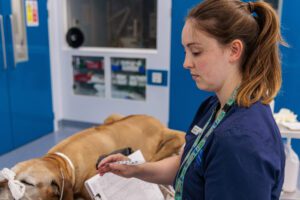Objective
To evaluate outcomes of radical excision of feline injection-site sarcomas (ISS) via assessment of local recurrence and metastasis rates, survival times, and complications associated with surgery.
Study design
Retrospective case series.
Animals
91 cats with ISS.
Methods
Medical records of cats that had radical excision of ISS without adjunctive treatment were reviewed. Information extracted included sex, type of surgical procedure, histologic tumor grade, tumor diameter, time from tumor detection to definitive surgery, complications associated with surgery, whether tumors recurred locally or metastasized, and survival times. Diagnosis of ISS was histologically confirmed, and additional follow-up was performed
Results
Overall median survival time was 901 days. Thirteen of 91 (14%) cats had local tumor recurrence; 18 (20%) cats had evidence of metastasis after surgery. Median survival time of cats with and without recurrence was 499 and 1,461 days, respectively. Median survival time of cats with and without metastasis was 388 and 1,528 days, respectively. Tumor recurrence and metastasis were significantly associated with survival time, whereas other examined variables were not. Major complications occurred in 10 cats, including 7 with incisional dehiscence.
Conclusion
Radical excision of ISS resulted in a metastasis rate similar to rates reported previously; the local recurrence rate appeared to be substantially less than rates reported after less aggressive surgeries, with or without adjuvant treatment. Major complication rates were similar to rates reported previously after aggressive surgical resection of ISS. Radical excision may be a valuable means of attaining an improved outcome in the treatment of feline ISS.






